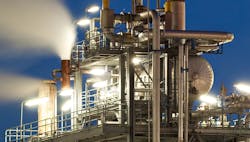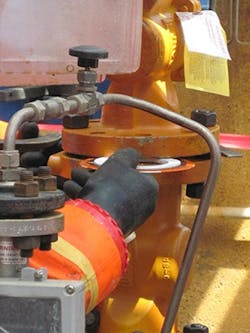Alkylation units are critical in petroleum refining — not only for producing high-quality gasoline but also for processing one of the most dangerous chemicals in the industry, hydrofluoric (HF) acid. Safely and reliably sealing flange connections in the piping systems of HF alkylation units is an issue that’s plagued refineries for decades.
Refineries that operate HF acid alkylation units are keenly aware of the unique challenges and costs associated with HF acid. Broadly, these break into two categories:
1. Environmental, health and safety. HF acid is among the most dangerous acids commonly used in refineries. While it’s not considered a strong acid (in terms of its disassociation in water), even small splashes on the skin can prove fatal. The U.S.’s National Institute for Occupational Safety and Health considers it harmful to life and health at airborne levels as low as 30 ppm.
2. Internal corrosion of pipe flanges. While anhydrous hydrogen fluoride is easily sealed and contained within carbon steel flanges, the addition of even small amounts of water results in the creation of aggressive HF acid, which can corrode carbon steel flanges from the inside.
Both challenges create imperatives for refineries relying upon HF alkylation, and each directly impacts gasket-related decisions in HF acid service.
First, the heightened health and safety risk posed to plant personnel and surrounding communities by HF acid means that no release is acceptable. The primary function of any pipe flange gasket is complete containment of HF acid.
Second, to prevent the failure of flanges due to internal taper corrosion, sealing the inner diameter of the flange to stop the intrusion of HF acid across the flange surface demands deliberate care.
Figure 1. Proper flange separation allows for uninhibited insertion of gasket.
One Refinery’s Response
In 2014, a refinery based in the U.S. Midwest was preparing for a major upgrade in its HF acid alkylation unit. This required the tie-in of new equipment to improve both the process and capacity. The engineering staff knew that the gasket the site historically used on the alkylation unit did not properly address the two imperatives of sealing HF acid. While the refinery had achieved reasonably good external leakage control, it regularly incurred damage to the pipe flanges — a problem common to other HF operators.
To combat this problem, some refineries regularly cut off and replace up to one third of all flanges opened during turnaround activities. To reduce the number of flanges swapped out, others prefer to weld-build damaged gasket surfaces and then machine them in the field to the ASME B16.5 specification. With either method, the tab for repairing corrosion damage is huge but accepted as a standard cost associated with using HF acid.
Engineers at the Midwest refinery were unwilling to accept the status quo and, so, undertook a study of emerging gasket technologies to determine if any could satisfy the two key imperatives — first, to tightly protect against external leakage with a highly loaded primary seal and, second, to simultaneously seal a soft conformable material to the interior of the flange to block acid intrusion — all with the available stud stress. The study took the refinery engineers to three prominent North American gasket companies, where they reviewed each organization’s latest sealing advancements and audited their manufacturing capabilities.
After completing the study, the engineers determined that only one product, the Alky-One gasket designed and manufactured by Advanced Sealing (an ERIKS company), Norwalk, Calif., met their designated performance criteria.
Designed specifically for HF-acid service, the Alky-One gasket has a patented design that generates very high seating stresses on the external primary seal to prevent release of HF acid. That design includes a two-stage inner barrier pillow that effectively seals to the interior diameter of the flange, preventing taper corrosion.
The engineers also contacted end-users of the Alky-One gasket; their positive testimony provided the field verification needed to confirm its effectiveness.
Implementation
The tie-in project took place in 2015 as part of a planned alky-unit turnaround. Preplanning for the event was extensive and well-coordinated, involving engineering, inspection, operations and maintenance personnel and contractors. Advanced Sealing, the gasket manufacturer, conducted two on-site seminars, one for the engineering group that detailed the gasket’s design principles and test results, and another that covered inspection so refinery personnel could gain a thorough understanding of potential quality issues.
To further ensure plant safety, the refinery developed a targeted quality control/inspection plan that tagged every flange. The plan also required sign-off by the pipe fitter and quality control inspector for each of the following elements:
• the cleaning and inspection of the flange faces;
• proper flange alignment;
• verification of gasket type, size and condition;
• correct fastener type, condition and lubrication;
• the presence of hardened washers;
• verification of tool calibration; and
• proper torqueing procedures used to generate correct target torque.
Extra inspectors were hired to enable following this intense inspection and sign-off protocol for every flange.
The Results
The refinery installed 3,119 Alky-One gaskets during the 2015 turnaround. On startup, all flanges were leak-free; they continue to run leak free to date.
During the next scheduled turnaround in 2019, the refinery opened 1,320 (more than 40%) of the flanges in which the Alky-One gaskets were installed and fully inspected each opened flange. It found that all were in like-new condition, with no need for repair or replacement. This 0% repair/replacement fraction is unprecedented for the refinery — and the industry in general.
Combining excellence in engineering design and exceptional attention to installation practices, the Alky-One gasket has proven its ability to provide unmatched sealability and flange protection in the industry’s most hazardous application. The refinery’s next turnaround is scheduled for 2023.
DAVID CLOVER is a senior product/application specialist for ERIKS North America, Pittsburgh. Email him at [email protected].

